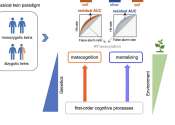Ruminating on our ruminations causes more depression
Once you have depressive symptoms, it's easy to fall into a pattern where you aggravate the disorder by ruminative thinking.
May 17, 2022
0
120
Once you have depressive symptoms, it's easy to fall into a pattern where you aggravate the disorder by ruminative thinking.
May 17, 2022
0
120

A series of experiments at EPFL provide conclusive evidence that the brain uses a single mechanism (supramodality) to estimate confidence in different senses such as audition, touch, or vision. The study is published in the ...
Sep 25, 2017
0
525

At New York University, Sir Henry Wellcome Postdoctoral Fellow Dr. Steve Fleming is exploring the neural basis of metacognition: how we think about thinking, and how we assess the accuracy of our decisions, judgements and ...
Feb 27, 2012
4
0

Metacognitive judgments of non-experienced events are processed in the frontopolar cortex of the brain, whereas metacognition of experienced events is associated with the dorsal prefrontal cortex, as reported in a study on ...
Jan 26, 2018
0
101

Imagining something with our mind's eye is a task we engage in frequently, whether we're daydreaming, conjuring up the face of a childhood friend, or trying to figure out exactly where we might have parked the car. But how ...
Jun 16, 2011
3
0
How neat is your handwriting? The accuracy of the answer to this question relies on metacognition, the introspective evaluation of the success of cognitive processing. Despite extensive investigation of the brain architectures ...
Jul 27, 2021
0
401

Three RIKEN neuroscientists have found a region of the brain in macaques that is responsible for integrating information from different sources during decision making. This finding, published in Cell Reports, will help inform ...
Jul 5, 2022
0
101

(Medical Xpress)—A novel psychological treatment to reduce the severity of delusional episodes experienced by people with psychosis is being trialled in a new Flinders University study.
Mar 14, 2014
5
0

Twin studies have proven invaluable for teasing out the effects of both genetics and the environment on human biology. In a study published April 2 in Cell Reports, researchers studied pairs of twins to look at how the interplay ...
Apr 18, 2024
0
31

In 1884, while attempting to define the limits of human perception, Charles Pierce and Joseph Jastrow discovered something else: the limits of our insight into ourselves.
Oct 4, 2021
0
0
